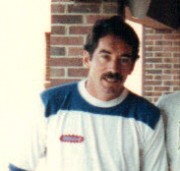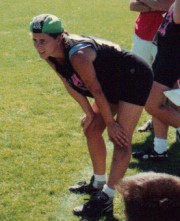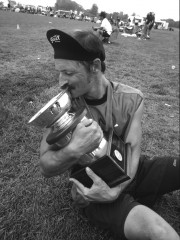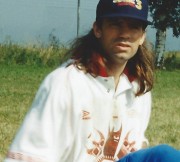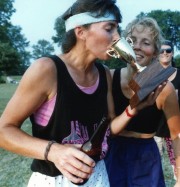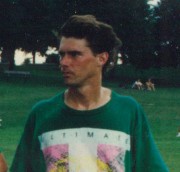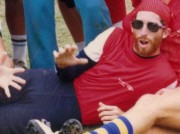The first ever TUC Hall of Fame induction took place on October 22, 2010, as we celebrated the 30 Year Anniversary of the Toronto Ultimate Club. The Class of 2010 can be found here.
Class of 2012
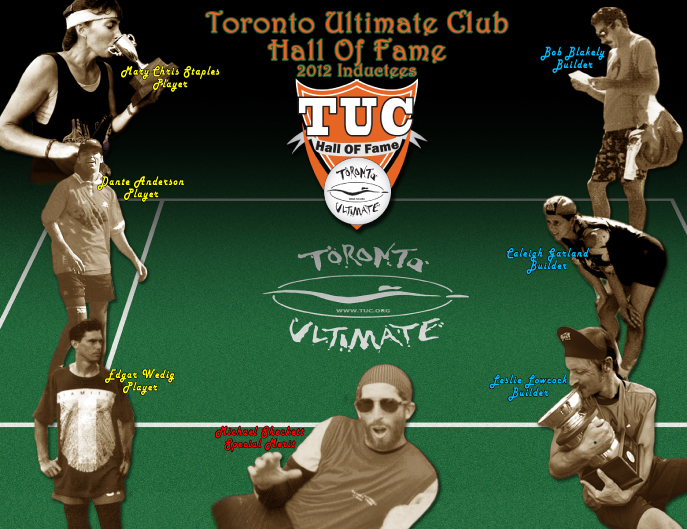
Bob Blakely - Builder
The Club owes a lot to the man known as ‘Frisbee Bob’ – Robert Blakely gave so much to build and develop Toronto Ultimate and disc sports in general. He was a co-founder of the original Toronto Ultimate League (TUL) in the early 1980’s and was an integral force in its growth through the early years.
Bob served as a Wham-O touring professional from 1975 - 79 and performed hundreds of demos and halftime shows across North America. Then as the Premium Promotions Manager at Irwin Toy in the 1980’s, Bob promoted and sold the Wham-O Frisbee brand product and all things disc related. He sold close to 1 million fastback Frisbees around the continent and ran the Canadian Junior Frisbee contest across Canada for 6 years. It was Bob’s goal to place a disc in the hand of every person that he could reach; from the time he started tossing a disc in the mid-1960’s Bob new it was something special that needed to be shared.
As an all-around disc sport player Bob participated in the first-ever Canadian Open in 1972 (GUTS & Distance), in the World Overall Frisbee Disc Championships at the Rose Bowl in 1978 (his Canadian team placing 2nd), in Finland and Sweden at World Championships, and at the 1986 World Disc Golf Championships in Charlotte (placing 2nd and nailing one of his 6 career aces). He attended the first ever meeting of the World Flying Disc Federation in Sweden in 1983. He also organized the 1987 World Disc Golf Championships and served on the 1991 World Ultimate Championships Committee, both world class events in Toronto.
Bob also introduced many a new player to disc sports whether it be disc golf or freestyle on the island, or ultimate on the beach. He was a key figure in working with the Parks Dept in Toronto and getting the fields to use at Kew Gardens (by the boardwalk) where the TUL first started. He was a spokesman and ambassador for the sport. Bob contributed in the daily administrative tasks of the league, provided office resources through Irwin Toy, leveraged his media contacts, brought in sponsors for the league, and provided leadership in business and events where many were young and inexperienced at that time. Irwin Toy also provided the insurance, which was critical for playing and growing the league! Bob rented a flat in the beaches and all his roommates and friends became pick-up players to help start the TUL. Bob co-founded and captained the Beaches team for years and was a great player for one that was on average 20 years older than his counterparts.
Bob was a die-hard Frisbee and ultimate player who played for more than a decade until his body couldn't do it anymore. He served as recruiter/promoter, team leader/captain, and clinician/instructor to all. He possessed great disc skills and was a fun and welcoming gentleman who influenced a multitude of ultimate players. He wholeheartedly played the game, built the league, and elevated the 'collegial' lifeblood of the Club. Frisbee was his life and Bob gave all of himself to it.
Caleigh Garland - Builder
Caleigh started playing Ultimate in 1986 when there were few teams in the league and very few women players. It was a struggle to recruit women players but there was a core group of about eight women who formed the See Jane Run team and travelled extensively to find tournaments. See Jane Run became a regular threat to the US Nationals feeder tournaments, often challenging the best teams in the East in Sectionals and Regionals. Caleigh co-captained the team and was keenly looking for ways to encourage new players to join the touring team and a league team. The touring team provided the opportunity for women to grow their skills in a big way and the influx of this skill to league play contributed to the overall advancement of Ultimate in Toronto.
Ultimate was growing as a sport in North America and Caleigh was a founding member, and co-captain, of a dominant women’s touring team. Her leadership extended into design and production of the team uniform. She also convinced a professional trainer to lead the team through fitness exercises at U of T and other locations followed by an inter-squad game. Additionally, Caleigh led the project to incorporate See Jane Run as a non-profit organization dedicated to promoting women in sport.
Caleigh led by example. She was friendly and outgoing and recognized that there was no one source from which to recruit more women players – women came to ultimate from all different sports and some from no sporting background at all. And so the key factor was to provide people the opportunity to see women’s ultimate being played at both league and touring levels. Caleigh coordinated many different Ultimate practice locations and events to support the game’s development and increase interest in playing competitive ultimate for women. She was instrumental in advancing the perception of women’s ultimate as a social gathering to a serious and elite level sport.
Caleigh was dedicated to growing the number of women players and developing their skills by providing opportunities to play and learn. She led the team with intelligence and strength of spirit. She motivated women to play, play hard and play well. Caleigh led See Jane Run to 6 sequential National Championships and participation at World Championships in Leuven, Belgium and Oslo, Norway before pausing for the birth of her daughter.
Leslie Anthony Lowcock - Builder
Leslie Anthony Lowcock, also known as Les, started playing pickup ultimate in the beaches in the late 1970’s. In the fall of 1978 Les and his friends organized and held Canada’s first ever outdoor ultimate tournament at the University of Waterloo. And along with other fellow disc legends he helped to turn pickup into a small 4-team league at the beaches, the early origins of the Toronto Ultimate League (TUL) and TUC. Les’ team was named Orange Crush. As one of the serious ultimate players in the group, Les joined Darkside and helped them win the first ever Canadian Ultimate Championships in 1987.
From the beaches and into the early 1990’s, Les captained a team every year in the TUL. Teams like the Cunning Runts, Passing Wind, and the infamous Sally Ann which was in the Finals every year against arch-rivals Wild Thing. Les was also a key builder in the touring community as well – in the early 90’s he coached Zero Tolerance, Toronto-Toronto, Rebellion and assisted Dave Lewis with PAM. He also helped form men’s and women’s touring teams in Montreal from 1992 – 1994 while he taught at McGill University. He took or traveled with teams to the National Championships for at least 11 consecutive years, and he played in over 100 tournaments around the world.
As a player Les has won multiple National Championships (Open ’87, Masters ’04) and has represented Canada in numerous world ultimate events: Belgium ’88, Norway ’90 (Masters Silver), Toronto ’91, USA, ’93, UK ’94 (Masters Silver), Vancouver ’97 (Masters Bronze), USA ’98 (Masters Gold) and USA ’00. Winning Masters Gold for Canada in 1998 ranks as his greatest playing achievement, sharing the victory with many of his comrades with whom he first toured in 1988.
For a decade through the 80’s and 90’s, Les was an administrative force for ultimate. He worked with his brother Chris in organizing Toronto leagues and recruiting players. He coached teams on any night he could. He served as the Public Relations Director for the 1991 World Ultimate Championships in Toronto. Les is also a professional writer (pen name Leslie Anthony) and over the years he wrote many articles about ultimate that were published in popular magazines and journals.
Not only did Les help build the Toronto Ultimate League from the beginning, but he also assisted with the formation of leagues in Vancouver (1986), Montreal (1992 – 1994) and Whistler (2000 – 2010). Leslie Anthony Lowcock was the consummate team and league builder. He continues to play in his home base of Whistler at the age of 56.
Dante Anderson - Player
Dante was one of the first pioneers of high-level competitive Ultimate in Toronto, raising the sport to what we consider today as Open Touring. Together with a key group of hard-core ultimate players Dante started Darkside - the first Toronto club travelling team. He brought with him his experience as a founding member of the McGill club team and a member of the first Canadian National Team, the 9-man squad that played Worlds in Switzerland in 1984. Dante also played a part in the inaugural season of the Toronto Ultimate League with helping to form and lead his team Agent Orange, one that would continue on with great success in the league.
With Dante as captain, Darkside went on to win the first Canadian Nationals Open title beating Calgary in 1985 in Ottawa in a 4-hour grueling match. Dante shut down Calgary's best players, laying out and skying right up to the very last winning point. The next year, Dante's skills were recognized by the country's best players in choosing him to be the first Canadian to captain the National Team, going on to finish in 7th place at the Worlds in Leuven, Belgium. Dante has represented Canada on 7 National, 5 Open and 2 Masters Teams from 1984 through 1996, including an Open Mens silver medal at the 1992 Worlds in Japan and countless game MVP selections throughout his career. He also simultaneously won two Worlds GUTS silver medals, along with being a standout player in several other disc sports.
Dante considered Defense the best path to victory in Ultimate and he practiced what he preached. He was constantly laying out on D, usually many times in a game and occasionally several times in a single point - his teammates recount many memories of Dante flying out of nowhere to make the D block then getting up to make the catch for the goal. He was also an innovator of zone offense and defense, taking it to new heights to garner Darkside and his Worlds teams many victories. Being a humble player and quite the joker, he would readily admit that he didn’t have much of a flick, so his strong defense was compensating for poor offense. But that belies his overall game impact on the field. He quickly became a highly skilled handler and his lightning sprint speed meant he was also a threat for the deep strike, often ending with a spectacular diving bid in the end zone.
Although he played with incredible intensity on the field, Dante rarely called fouls and was a firm believer in the Spirit of the Game and non-officiated play, even at the Worlds level. He enjoyed sharing his passion and skills in the sport, dedicating himself to coaching new prospects and turning them into great players. Many players of his era and those of the years ahead would state that Dante had a great influence on making them the ultimate players they became. Dante played well ahead of his time, and in any era he is one of the great players deserving of Hall of Fame induction.
Mary-Chris Staples - Player
Mary-Chris began playing Ultimate in 1987 after being introduced casually to the network of players in downtown Toronto. Mary-Chris started playing in the league on Clockwork Orange, a team filled with early founders and enduring stars of Toronto Ultimate. She got hooked on the game and soon became a key member and co-captain of the women’s touring team, See Jane Run, winning 6 consecutive National Championships and participating in 2 World Championships (Belgium 1988, Norway, 1990). See Jane Run was dominant in Canadian Ultimate for a number of years because of core players like Mary-Chris and their abilities. There were a few rivalries with other clubs – Montreal’s Lipstick Girls and Calgary’s Flo – and they were well aware of Mary-Chris’ ability to impact the outcome of a game!
Being supremely fit, Mary-Chris was an easy convert to the sport. Her athleticism was one of the key factors in Mary-Chris’ reputation as one of the worst people to mark – lining up opposite her meant you were faced with endless sprints. She often had the most difficult defensive assignments and yet she seemed tireless and was able to stay on the field point after point. Mary-Chris was a dominant player as result of this ability and the reputation that came with it and her dedication to working hard was motivational to all those around her.
The second factor in Mary-Chris’s impact on the sport was her positive energy, endless support for her team-mates and encouragement for all those around her who enjoyed playing ultimate. Often, when faced with an opponent new to the game, Mary-Chris would provide enthusiastic coaching and direction as she ran the poor girl ragged! Over time, Mary-Chris has taught hundreds of students to play Ultimate both formally and informally. She was also an ambassador for Toronto’s Ultimate community, and made herself available for promotional events and media coverage. She was easily one of the best representatives of the sport.
You could not have a better team-mate than Mary-Chris; she was unstoppable on the field, was enthusiastic to work as hard as possible and was always quick with a smile and a laugh.
Whether it was leading her teams (Lethal Sushi and others) to perennial league finals or dominating on the women’s touring circuit, Mary-Chris’ play and attitude were integral to the successes she achieved for herself, her teams and for Toronto Ultimate.
Edgar Wedig - Player
Edgar Wedig, or "HeadGar" as he was sometimes called, is a name known across Canada as one of the elite players for over two decades. His game could be characterized as frantic, possessed, or even chaotic… but what it could definitely be called was dominant. He combined his incredible speed with “springs” for legs and usually came out with the disc on most air battles. Defensively, he was best known for reading the offence and diving to knock down discs that were meant for players other than the one he was defending. Any zone defense against his teams was ineffective because he moved the disc so quickly and could weave through any net the other team put up. Edgar put his body last and winning the game first. From the starting point to the universe point, Edgar was always looked to as one of the players to get it done.
His impact in the Ultimate community began as one of the first members of the Toronto Ultimate League, leading one of the original 4 teams “Agent Orange” (which then became Clockwork Orange) to win consecutive league titles in 1987 and 1988. Edgar played over 17 years always as an elite player in the league, and was a member of teams which won multiple league championships, including the Synergy dynasty. Edgar’s presence was even more evident in the Open game, playing on Darkside in winning the first Canadian Nationals title in 1987. He continued to be one of the main top players on the Toronto Open teams for nearly twenty years, eventually forming his own Open team to develop young players into high-level competitive players. That team was called Betheone, which evolved into YES, which would later become GOAT, and many latter day superstars attribute their development to the influence of Edgar’s coaching.
Edgar has played on both league and touring teams for every year he lived in Toronto, won league championships, won national championships, played on several Canadian National teams at numerous Worlds including the first years in Belgium and in Switzerland, and later in his career played Nationals, UPA’s, and Worlds in the Masters division. More recently, he and his wife moved their family to China where he was a top Open player in the Asia Ultimate touring circuit and won the first China National Ultimate Championships. His list of playing accomplishments are worth more than just the fact that he has achieved so much; what his very humble character has shadowed throughout his career is how actually good of a player he was, and still is today.
Michael Shockett - Special Merit
Michael was a major factor in the early years of growth of the Toronto Ultimate League. He and his wife, Cyndi, gave countless hours volunteering to organize and support the league in its first decade. Very few surpassed Michael’s contributions and he was one of the few who shared in all the responsibilities for the league. He served the roles of scorekeeper, photographer, printer, permit facilitator and most of all the Spirit and rules guru. He captained many teams like Fuschia Shock and Big Dogs to many league victories and he played on the Open touring team Darkside. He also coached and fostered the emergence of women's touring ultimate in Toronto that would, with his guidance, become THE powerhouse dynasty in Canada. Aside from any female player, he was the most important male player to support women's ultimate in Toronto in the 1980's.
Michael introduced, mentored, fostered, and refined so many players of ultimate in Toronto. From his fellow player and friend Amy Young, “Michael was a great patient and welcoming leader. It was amazing how he could tolerate playing with those of us who were not very good. He wanted to share the Game. He would play anywhere with anyone at anytime.” His sister Elka said that Michael found the game of ultimate as an adult and that, “he loved everything about the game, the camaraderie, the life-long friends he made, the being part of something bigger than everyday life.
Michael connected to his soul-mate Cyndi through ultimate and their passion for helping others. He once sustained an ultimate injury that landed him in the hospital (he needed many pins in his arm), and it was through her daily visits that Cyndi and Michael first developed their partnership. They bonded further through playing ultimate and through their work at the United Jewish Association - Federation of Greater Toronto. Michael was presented with an award for over 25 years of service to the UJA and the Bathurst Jewish Community Centre.
Michael played competitively in Toronto and both he and his wife traveled to the USA where they continued to play. In 2008, a tragic accident ended the lives of Michael and Cyndi and took them from the ultimate community far too early. But their zest for life, their infectious smiles, and their love for the game of ultimate remains firmly entrenched in our hearts and in the Toronto Ultimate Club.





